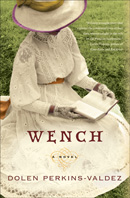
To enter the world of Wench is to imagine oneself dying of thirst while surrounded by water, or starving while everyone else eats their fill. Using an unusual setting, Perkins-Valdez's debut novel illustrates the painful temptation that confronts a slave in a world where freedom hangs like forbidden fruit on every tree.
In pre-Civil War America, it was a habit of some Southern slave owners to journey to a summer resort in free-state Ohio, accompanied by their favored slaves, who were sometimes their concubines. Leaving their wives behind, these gentlemen might enjoy manly outdoor sport during the day and return to their cottages to enjoy the pleasures of that one special slave at night. Some carried out a parody of married life, allowing their slaves to dress and behave in some ways like the wives they'd left at home, while maintaining the kind of control they might never exercise over their real wives.
In this niche of history, the author perches her fiction, focusing it on a group of slaves who have spent several summers at such a resort. For most of these characters, the lure of freedom is painfully tempting, as they witness free members of their own race who come and go, work for wages, marry and raise their children as they see fit. In addition, many of these visiting slaves find their bondage particularly tortuous: Rennie's white half-brother rents her body to the hotel manager; Mawu's cruel master is determined to tame her rebellious nature; Sweet is terrified that her children in the South will suffer if she betrays her owner. The reality of the Fugitive Slave Law, which ensures that they may be hunted down and recaptured even in the free North, further inhibits their actions.
But Lizzie, our protagonist, is perhaps most challenged by the lure of freedom because she is not sure she wants it. Lizzie loves her master and he appears to love her, as well as their shared children back in Tennessee. Although he is married to a proper Southern lady, Lizzie inhabits a room in his plantation home, her children eat well, and her family suffers little abuse. But they are slaves, their lives subject to the changing whims of their owner, and that fact gnaws at her as she watches her friends struggle with the temptation to escape when they are so close to freedom.
Perkins-Valdez's debut novel skillfully opens a world which is both familiar and new, bringing out the sting of bondage in the South by placing it in sharp relief against free-black life in 1850's Ohio. Carrying us back and forth in time and place, Perkins-Valdez lays out the past and a progressively more dangerous future for her characters.
By the end, each slave will have made a choice, and although their fates may be
surprising, they will all make perfect sense. Some will gain freedom, some merely peace,
and more than one will live to fight another day.

Armistad Press, hardcover, 9780061706547